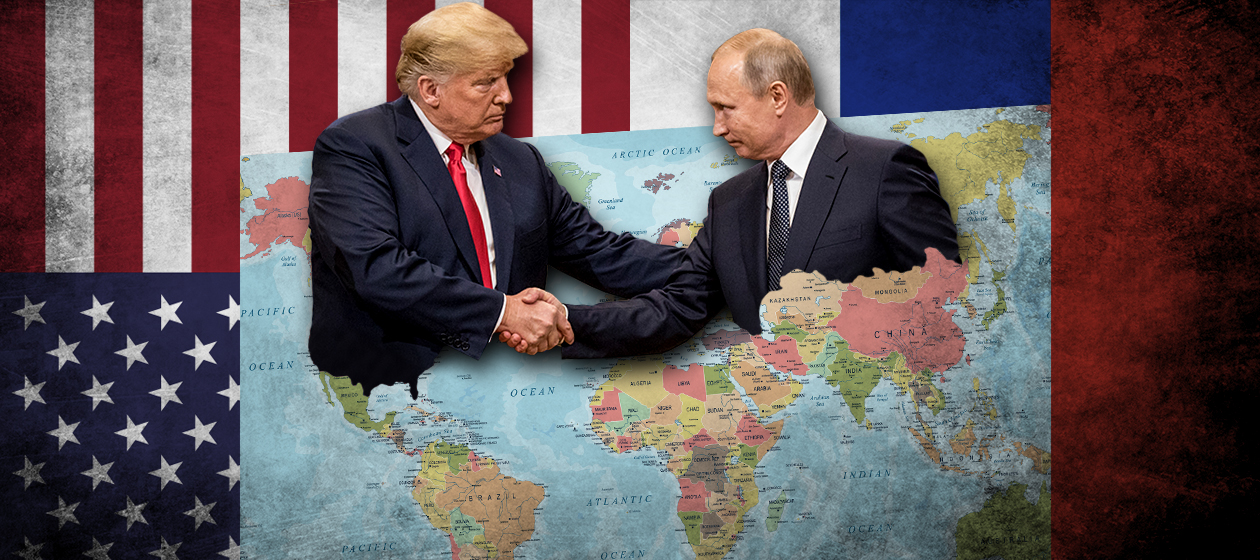The renewed relevance of neoconservatism
America can and must remain a force for good in the world. Instead we're speaking rudely and carrying a wiffle bat.


A free daily email with the biggest news stories of the day – and the best features from TheWeek.com
You are now subscribed
Your newsletter sign-up was successful
Does America even want to be a superpower anymore?
Since the end of the Second World War, the United States has played a dominant role in geopolitics. But today, as President Trump works to reorient the Republican Party around his "America First" philosophy, and simultaneously suffers a variety of widely criticized stumbles and spats in foreign affairs, we face an alarming possibility: Maybe Americans have grown tired of being a force for good in the world. Maybe they've become cynical about the very possibility. Maybe we no longer have a party willing to articulate and defend a principled vision for the exercise of American influence.
Trump's latest blizzard of geopolitical foibles (especially his recent meeting with Russian President Vladimir Putin) have underscored America's anxiety concerning her role in the world. Trump's actions have been widely derided, especially from the left. The left, though, is unlikely to assume the task of defending American influence abroad. For liberals, American hegemony has always been an uncomfortable reality. They appreciate many of the benefits of geopolitical dominance: security, prosperity, and a showy platform from which to lecture the world about the environment or women's rights. At the same time, American power makes them uneasy. Viewed through the cold lens of realpolitik, it is an affront to their egalitarianism. Ennobled with Captain America righteousness, it offends their cosmopolitan sensibilities. There are exceptions, but in general, progressives prefer to critique and question muscular American activities abroad, casting themselves as the voice of conscience. It has mostly been the right's task to defend the reality of American power, explaining how it can be used benevolently for our own and the world's good.
The Week
Escape your echo chamber. Get the facts behind the news, plus analysis from multiple perspectives.

Sign up for The Week's Free Newsletters
From our morning news briefing to a weekly Good News Newsletter, get the best of The Week delivered directly to your inbox.
From our morning news briefing to a weekly Good News Newsletter, get the best of The Week delivered directly to your inbox.
Many on the right now seem eager to abdicate this role, which was once such a defining element of the conservative coalition. This isn't just about Trump, of course. The Cold War is long over, and the Iraq War left neoconservatism sorely diminished. Most voters prefer to ignore geopolitics, except when they're scared, and they apparently are not thinking right now about the possibility of being nuked by Pyongyang. That's why a new kind of "America Firstism" has taken root in the GOP base. It flaunts American power, but is untempered by any sense of either obligation or restraint. It retains the right's traditional desire for dominance, but marries it to a strong disinclination to make sacrifices for anyone born on foreign soil. In practice, this approach yields a strange combination of bravado and pitiful weakness (as for instance when the leader of the free world is visibly anxious to make murderous autocrats like him). Its motto might be: Speak loudly and rudely, but carry a wiffle bat.
Trump is the perfect avatar for such a philosophy. Personally he is simply amoral, not committed to any political theory. Politically though, he is spookily in sync with the id of the GOP base, so he instinctively channels their most undisciplined impulses. By insulting and humiliating our allies, he strokes the resentment many feel towards the neoliberal, post-national, globalist world order. (He'll tell those Canadians who's boss!) Meanwhile, drawing ruthless dictators into a fraternal embrace perpetuates the happy illusion that the more painful aspects of global dominance can be safely abandoned. No need to be prepared for lean times or hard sacrifices. Ruthless tyrants can be dealt with over steaks and rocks glasses, with the bonhomie of a Tony Soprano. Just leave it to the negotiator.
It was encouraging to see, in the wake of Trump's performance in Helsinki, that many on the right were outraged and willing to say so publicly. Particularly shocking was Trump's disparaging of his own security services, demonstrating a willingness to sell out fellow Americans as a concession to a foreign dictator. Is this the behavior of an American patriot?
Perhaps that bracing scene will reawaken the right's willingness to articulate and defend a more palatable form of patriotism, which celebrates American strength within the context of a broader vision. Neoconservatives, who had such a vision, were sometimes accused of being starry-eyed idealists, and those accusations seemed especially plausible in the later years of the George W. Bush administration. The neocons understood, though, that America's global influence would be massively increased if we promoted a principled agenda that most human beings would want to support. We're not a gunpowder empire. Alliances, trade agreements, and transnational organizations have always been a huge part of America's geopolitical strategy, so it's ironic that Trump and his supporters would be so eager to disparage them, ostensibly in the name of patriotism.
A free daily email with the biggest news stories of the day – and the best features from TheWeek.com
There are reasons to think that America's role in global affairs may be diminished in coming years, regardless of what we do. In the face of China, Russia, North Korea, and other anarchic forces, the Pax Americana may not be fully sustainable anymore. That's all the more reason, though, for re-articulating the liberal values that helped animate our foreign policy for so many years. Our cynical mood notwithstanding, these principles are as relevant as ever.
The world still needs the kinds of political freedoms that can enable people to retain their beliefs and customs, while living peaceably alongside others who disagree. Nations are still better off if they can solve problems by drawing on the ingenuity of their people, rather than trusting to the benevolence of autocrats. We should continue to champion the kind of governance that respects human dignity, rather than sacrificing individuals to "five-year plans," "great leaps forward," or projects of social "purification".
This is not just the stuff of starry-eyed sloganeering. The United States has made mistakes in geopolitics (as powerful nations inevitably do), and we should acknowledge those. Even so, our nation has truly promoted these values abroad in myriad ways, as our enemies overwhelmingly have not. We should be proud of that American legacy, and we should want to honor and extend it as we can in the 21st century. It's acceptable to have a few skeptics, but our conversations about foreign policy will be better and more productive if at least some people believe that America can be a force for good. If we've lost that spirit entirely, we may need to reconcile ourselves to reality of diminished influence and security for ourselves and our descendants. Hopefully, Trump's gaffes will remind many conservatives that they do believe in freedom, after all.
Rachel Lu is a writer based in Roseville, Minnesota. Her work has appeared in many publications, including National Review, The American Conservative, America Magazine, and The Federalist. She previously worked as an academic philosopher, and is a Robert Novak Journalism Fellow.
-
 Sepsis ‘breakthrough’: the world’s first targeted treatment?
Sepsis ‘breakthrough’: the world’s first targeted treatment?The Explainer New drug could reverse effects of sepsis, rather than trying to treat infection with antibiotics
-
 James Van Der Beek obituary: fresh-faced Dawson’s Creek star
James Van Der Beek obituary: fresh-faced Dawson’s Creek starIn The Spotlight Van Der Beek fronted one of the most successful teen dramas of the 90s – but his Dawson fame proved a double-edged sword
-
 Is Andrew’s arrest the end for the monarchy?
Is Andrew’s arrest the end for the monarchy?Today's Big Question The King has distanced the royal family from his disgraced brother but critics claim a ‘fit of revolutionary disgust’ could still wipe them out
-
 Epstein files topple law CEO, roil UK government
Epstein files topple law CEO, roil UK governmentSpeed Read Peter Mandelson, Britain’s former ambassador to the US, is caught up in the scandal
-
 Iran and US prepare to meet after skirmishes
Iran and US prepare to meet after skirmishesSpeed Read The incident comes amid heightened tensions in the Middle East
-
 Israel retrieves final hostage’s body from Gaza
Israel retrieves final hostage’s body from GazaSpeed Read The 24-year-old police officer was killed during the initial Hamas attack
-
 China’s Xi targets top general in growing purge
China’s Xi targets top general in growing purgeSpeed Read Zhang Youxia is being investigated over ‘grave violations’ of the law
-
 Panama and Canada are negotiating over a crucial copper mine
Panama and Canada are negotiating over a crucial copper mineIn the Spotlight Panama is set to make a final decision on the mine this summer
-
 Why Greenland’s natural resources are nearly impossible to mine
Why Greenland’s natural resources are nearly impossible to mineThe Explainer The country’s natural landscape makes the task extremely difficult
-
 Iran cuts internet as protests escalate
Iran cuts internet as protests escalateSpeed Reada Government buildings across the country have been set on fire
-
 US nabs ‘shadow’ tanker claimed by Russia
US nabs ‘shadow’ tanker claimed by RussiaSpeed Read The ship was one of two vessels seized by the US military
